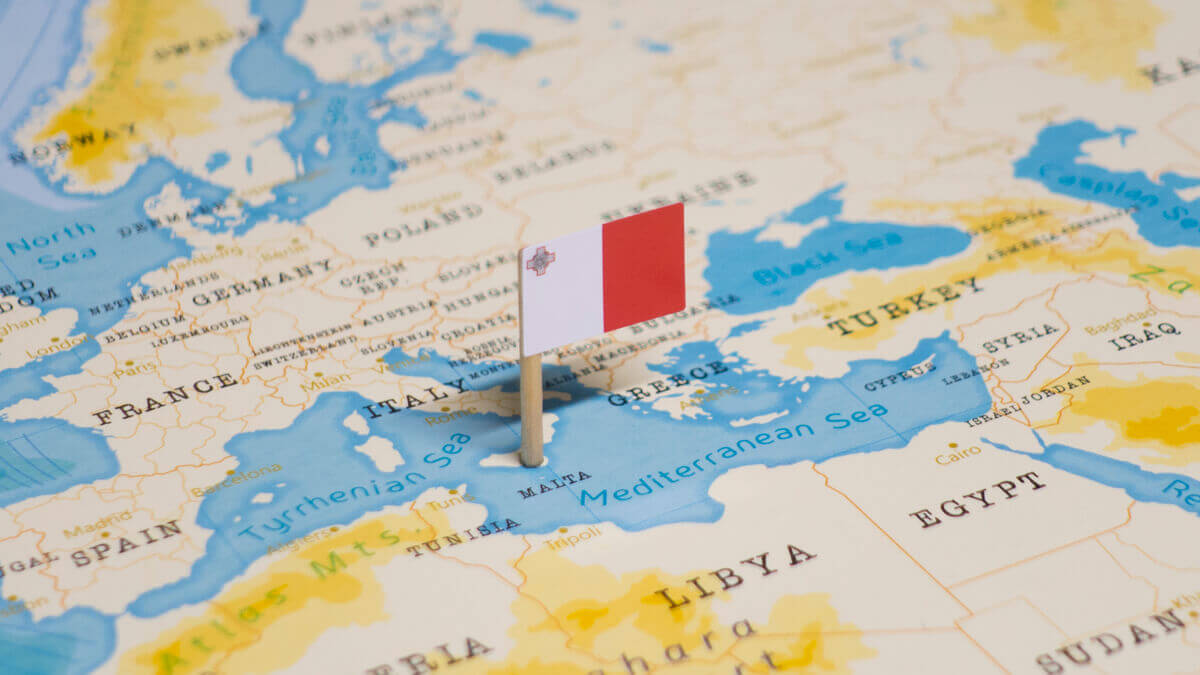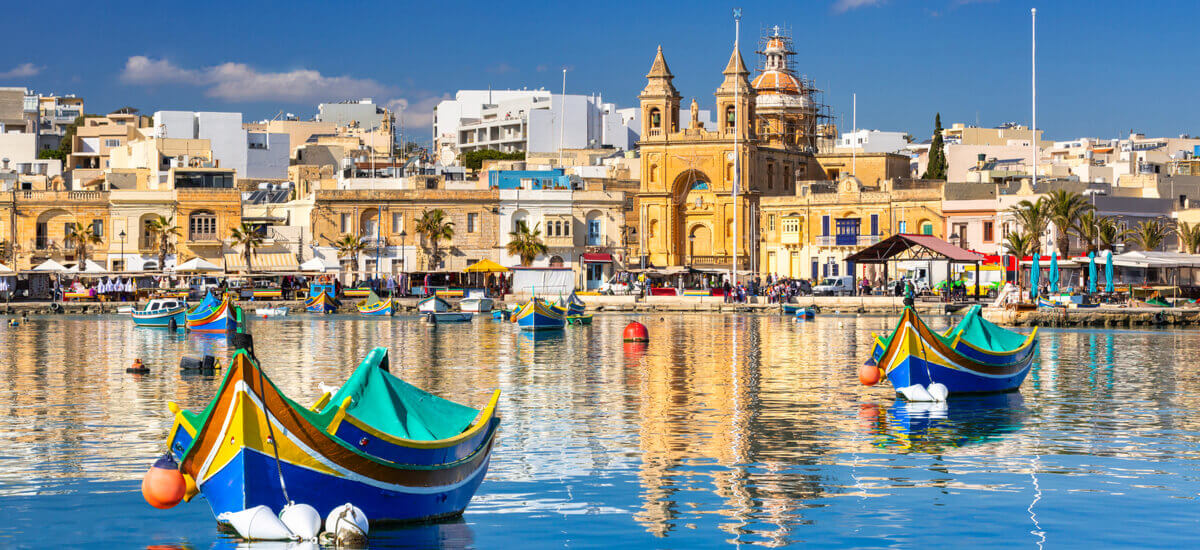Moving to Malta from USA: Everything you need to know
Moving to Malta from the US? This guide covers all the essential information for relocating to Malta as an American, including tips and insights.

Malta may be the EU’s smallest state, but there's no shortage of reasons to visit. With a fascinating cultural heritage, attractive climate and relaxed lifestyle, Malta is a popular place to live and work.
Various industries are flourishing on the islands, from financial services to gaming, thus creating jobs for talented individuals from all over the world.
If you're considering moving to Malta to work or start your own business then you might need a permit to do so legally. Get started, by reading this quick guide to getting your Maltese work visa.
| 📑 Table of Contents |
|---|
If you’re an American citizen you’ll likely need a work permit to be able to work legally in Malta¹. To get a work permit it’s normal to find a job first — and then your employer will complete the application process at their end to get your paperwork in order. It’s worth noting that it’s easier to get a work permit if you’re employed in specific industries like healthcare, gaming, finance and education.
Malta is part of the EU and, so citizens of other EU states can live and work there without any visa. If you hold dual citizenship from another EU country you may be covered by this provision.
Let’s walk through the main options to get the permit you need to work and do business in Malta.
Most people coming to Malta to work for an employer will need to have a work permit, which is arranged by the employer before the job begins. Your employer will need to follow an application process for this — which can be fairly lengthy in some cases.
The exceptions are if you’re taking a job in a shortage industry like those outlined above, or if you’re classed as a key worker in a managerial role. In this case the process may move quicker as there are fewer steps for the employer to take to have their application approved.
Depending on what you intend to do when you travel to Malta, another option may be a Schengen business visa. Schengen visas usually allow visits to Malta and other Schengen countries for up to 90 days in a 180 day period.
With a business type visa you’re not usually able to carry out paid employment for a Maltese employer, but this may be an option if you’re expecting to go to Malta for short term meetings with business partners, for example.
Check out the details of how to apply for a Schengen business visa on the website of the Maltese Embassy in the US².
To work on a self employed basis you might need an employment license³, which is issued by the Maltese government. You’ll be asked to prove you meet certain criteria, which include a planned investment of EUR 100,000⁴ in the first six months of your business being established or the ability to employ at least three local people in the first 18 months. In some cases you'll be able to get a license by producing a sound business plan which has been approved by the Maltese enterprise agency.
Usually you'll be issued an employment license and then have one month in which to apply for a residence permit. If you’re not physically in Malta at the time your license is issued, you'll have to apply for your residence permit as soon as possible once you travel to Malta.
If you're a third-country national then your family may be able to apply for residency in Malta at the same time as you arrange your work permit or employment license.
The exact process you need to go through would depend on your nationality and the type of permit or license you have in place¹.
Want to send Euros? See how much you may save with a Wise Account:
To work legally in Malta you might need an ETC employment license, which is applied for by your employer.
You will, however, have to provide supporting documents to allow your new boss to submit the license application on your behalf. We’ll cover the paperwork in more detail later.
First let’s look at the basic steps of getting an employment license in Malta:
Step 1. Find a job in Malta — this can be done before you arrive
Step 2. Your employer will need to apply for a permit for you, usually through the Single Permit procedure, or the Key Employee Initiative
Step 3. You’ll need to gather a set of supporting documents to be included with the permit application
Step 4. Your full application is submitted by your employer for assessment
Step 5. If approved you’ll be issued with the appropriate permit, which can normally be renewed annually
Step 6. You’ll then need to get any visa required to travel to Malta based on your nationality, and can apply for residence upon arrival
If you're a third-country national in Malta and decide to stay beyond your initial tourist visa, you can apply for residence once you're in Malta. As a non EU citizen, you’ll likely need to apply for permanent residence which is to be renewed annually.
Another option for non EU nationals, is the Maltese Global Residence programme, which is subject to stricter controls, but offers good benefits for those accepted into the program. To be eligible, you must prove you're maintaining a residence address in Malta and can then pay a 15% tax rate on income remitted to Malta. You’ll also need to show that you'll be able to support and have your family members join you. This is an attractive program because Malta is part of the Schengen area, making movement relatively free throughout Europe.
Forms needed for your visa application⁵ can be downloaded online. All applications are made in Malta, at the Department for Citizenship and Expatriates Affairs. You can either take your application in person, have someone else deliver it, or send it in by mail. However, you'll need to collect the document in person once it’s prepared for you.
It’s possible to have an agent help you with your residence application in Malta. Under usual circumstances this isn't needed because the process is quite simple. However, it can be worth having expert advice on the visa type best for your situation, if you have any doubts.
Whichever route you need to take to get your Maltese work permits arranged, you’ll need to provide a suite of paperwork. The exact documents needed depend on the industry you work in, the type of job, and the permit you need to arrange. Let’s take a look at the common options.
The details of what supporting documents are needed can be found on the relevant authorities’ website. There are different options you can choose, ensuring that you meet the criteria and have sufficient means to support yourself during your time in Malta. The website explains the different acceptable documents according to the purpose.
If you need an ETC employment license to be able to work in Malta then you'll have to supply a set of paperwork to support the application. The documents required usually include:
|
|---|
As part of the application for an employment license, your employer will have to prove that they tried to fill the position from within Malta and the EU before making an offer to a non EU national.
Depending on the type of work you'll be doing, it might be possible to apply for an EU Blue Card⁶. Similar to the US Green Card, this document gives you the right to work across most EU member states. To be eligible for a Blue Card, you must be from a country outside the EU, be highly skilled (typically meaning you have completed a bachelor's level university degree, or have five years of senior professional experience), and have a binding job offer or active work contract.
The Blue Card application process is fast tracked by member states meaning it’s typically quicker than other forms of work visa application. However, it may still take up to three months. Although you start the application process online and through a single point of contact, the process may vary depending on your personal circumstances. The Blue Card network⁶ has a good website and offers support to applicants to help them understand the process.
Standard work permits issued under the Single Permit procedure can take a couple of months to be assessed and issued. However, this process may move faster if you work in a shortage industry as there are fewer checks for the employer to carry out before being able to employ a third country national.
Applications made under the Key Employee Initiative should be quicker — the aim is to process these in weeks rather than months. Check the latest processing times when you submit your application.

There are several routes to become a Maltese citizen, including citizenship through descent, naturalization or investment. The options open to you will depend very much on your situation, but opting for citizenship through naturalization or investment⁷ may be the most obvious choices to pursue.
You may be eligible to become a citizen of Malta through naturalization if you’ve lived there for 5 years, including the 12 months prior to your application. You’ll need to also prove you’re of good character, can speak either Maltese or English to a reasonable level, and have two Maltese sponsors, one of which must be active in public life — such as a police officer or a priest.
Depending on the situation, you’ll also need to submit supporting documents and pass a number of checks to ensure you’re suitable to become a citizen of the country.
|
|---|
Life in Malta is attractive for many good reasons — wall to wall sunshine, great career opportunities and a friendly, largely English speaking community can make it a very easy place to settle.
However, there are a few things that are likely to be quite different to home, which are worth thinking about before you jet off.
For one, Malta is a small country which sees huge seasonal influxes of tourists. This has some great economic upsides, meaning there’s a non-stop party atmosphere — and also means that getting around in the high season can be a nightmare. The popularity of the country with tourists can also contribute to high rental prices and ongoing construction as infrastructure tries to keep up.
All that said, for many Americans who have moved to Malta before you, the culture, climate and cuisine on offer far outweighs any downsides you might run into — making it a perfect place to consider if you want an adventure.
To get the most of your money in Malta, you'll want to open a bank account in Malta, which you can do before you arrive.
Once you send money either to or from Malta, consider using a money conversion service like Wise to avoid unfair exchange rates.
With Wise you know upfront how much each transaction will cost you and they use the mid-market exchange rate — the one you see on Google — without any spread or markups.
If you don’t want to go through the hassle of opening a new bank account, you can get a Wise Account, an alternative for sending, spending and receiving EUR like a local.
Set up a Wise account in minutes
Please see Terms of Use for your region or visit Wise Fees & Pricing for the most up to date pricing and fee information
So there you have it — your full guide to getting a Malta work visa so you can boost your career in Europe while enjoying year round sunshine and a fun, friendly new place. Enjoy!
Sources:
Sources checked on 03.24.2022
*Please see terms of use and product availability for your region or visit Wise fees and pricing for the most up to date pricing and fee information.
This publication is provided for general information purposes and does not constitute legal, tax or other professional advice from Wise Payments Limited or its subsidiaries and its affiliates, and it is not intended as a substitute for obtaining advice from a financial advisor or any other professional.
We make no representations, warranties or guarantees, whether expressed or implied, that the content in the publication is accurate, complete or up to date.

Moving to Malta from the US? This guide covers all the essential information for relocating to Malta as an American, including tips and insights.

Everything you need to know about getting a Golden Visa in Malta.